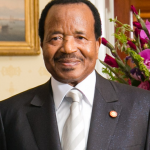Politics
Cameroon Politics
This page explores Cameroon‘s political structure incorporating real-time RSS feed news and videos. By harnessing the power of RSS feeds, visitors can stay informed about the latest developments in Cameroon‘s politics as they happen. The dynamic nature of these feeds ensures that users receive up-to-the-minute updates on political events, policy changes, and significant milestones, enabling them to stay abreast of the ever-evolving political scene.

Paul Biya
2nd President of Cameroon
Incumbent
Assumed office
6 November 1982
Image credit
Cameroon operates under a semi-presidential republic political structure. The country is a unitary state with a dual executive system. The President of Cameroon serves as the head of state and holds significant executive powers, while the Prime Minister is the head of government and is responsible for leading the administration.
The President of Cameroon is elected by popular vote for a seven-year term and can be re-elected. The President has extensive powers, including the ability to appoint the Prime Minister and members of the government, as well as dissolve the National Assembly. The Prime Minister, appointed by the President, leads the government and implements policies. The parliament of Cameroon is a bicameral legislature known as the National Assembly. It consists of two chambers: the National Assembly and the Senate. Members of the National Assembly are elected through a mixed electoral system, while Senators are appointed by the President. The parliament is responsible for enacting laws, approving the national budget, and exercising legislative oversight. Cameroon also has a judiciary system that operates independently from the legislative and executive branches. The judiciary ensures the interpretation and application of the law, upholds justice, and protects the rights of individuals. The Supreme Court of Cameroon is the highest court in the country and serves as the final appellate instance.
It is worth noting that Cameroon has faced challenges related to political stability, human rights issues, and regional conflicts. There have been concerns raised about limitations on political freedoms, media freedom, and civil society activities. Efforts to address these challenges and strengthen democratic institutions continue in Cameroon.
Unless other sources are cited, original content is provided by ChatGPT. ChatGPT may produce inaccurate information about people, places, or facts. #CameroonNews #CameroonPolitics #CameroonRSSFeed #CameroonNewsToday #BlahFace



